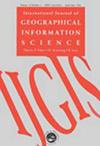利用Bezier曲线逼近旋转运动区域的演化
IF 4.3
1区 地球科学
Q1 COMPUTER SCIENCE, INFORMATION SYSTEMS
International Journal of Geographical Information Science
Pub Date : 2022-11-15
DOI:10.1080/13658816.2022.2143504
引用次数: 3
摘要
摘要移动对象数据库文献中提出的区域插值方法施加了限制,这些限制可能对移动区域的演化表示产生重大影响,特别是当两个观测值之间发生旋转时。在本文中,我们提出了一个移动区域的数据模型,该模型允许移动片段在两次观测之间的进化过程中旋转和改变其长度,并使用二次贝塞尔曲线来定义其端点的轨迹。这引入了一类新的移动区域,称为旋转移动区域(rmregions)。我们提出了涉及rmregions的运算算法,并提出了一种策略,通过近似它们使用rmregions创建的插值,允许在移动对象数据库的上下文中使用不同的插值方法。我们使用参考实现演示了我们的策略,并比较了使用此处提出的策略和最新技术中提出的区域插值方法和时空运算时获得的结果。实验结果表明,我们的策略可以用来补充运动对象数据库文献中提出的区域插值方法。本文章由计算机程序翻译,如有差异,请以英文原文为准。
Approximating the evolution of rotating moving regions using Bezier curves
Abstract The region interpolation methods proposed in the moving objects databases literature impose restrictions that can have a significant impact on the representation of the evolution of moving regions, in particular, when a rotation occurs between two observations. In this paper, we propose a data model for moving regions that allows moving segments to rotate and change their length during their evolution between two observations and uses quadratic Bezier curves to define the trajectories of their endpoints. This introduces a new class of moving regions called rotating moving regions (rmregions). We present algorithms for operations involving rmregions and we propose a strategy to allow different interpolation methods to be used in the context of moving objects databases by approximating the interpolations they create using rmregions. We demonstrate our strategy using a reference implementation and compare results obtained when using the strategy presented here and the region interpolation methods and the spatiotemporal operations proposed in the state-of-the-art. Experimental results show that our strategy can be used to complement the region interpolation methods proposed in the moving objects databases literature.
求助全文
通过发布文献求助,成功后即可免费获取论文全文。
去求助
来源期刊
CiteScore
11.00
自引率
7.00%
发文量
81
审稿时长
9 months
期刊介绍:
International Journal of Geographical Information Science provides a forum for the exchange of original ideas, approaches, methods and experiences in the rapidly growing field of geographical information science (GIScience). It is intended to interest those who research fundamental and computational issues of geographic information, as well as issues related to the design, implementation and use of geographical information for monitoring, prediction and decision making. Published research covers innovations in GIScience and novel applications of GIScience in natural resources, social systems and the built environment, as well as relevant developments in computer science, cartography, surveying, geography and engineering in both developed and developing countries.

 求助内容:
求助内容: 应助结果提醒方式:
应助结果提醒方式:


